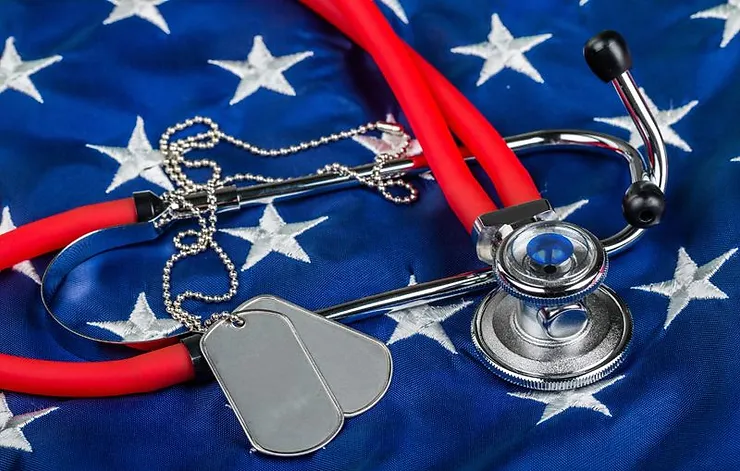By Dr. Josef Ruzek, VHPI Advisory Board Member
Over many years as a clinical psychologist inside the Department of Veterans Affairs National Center for PTSD, I was always thinking about how America could better deliver mental health care.
Many of the most vexing questions in this policy area are expertly explored in a new report from the George W. Bush Institute Military Service entitled “Increasing Access to High-Quality Mental Health Care in the 21st Century.” I am in strong agreement with virtually all of its insights and recommendations.
Most importantly, the report calls for “measurement-based care,” and rightly differentiates between access to, and quality of, care. Finally, the report expertly plumbs the future of technology integration. I’ll break out explore some of these topics below.
Measurement-based care (MBC).
This clinical approach is not radical. It simply holds that, if mental health providers are to do their jobs effectively, they must measure the impact of their services, before, during, and after the help they give.
Contrary to popular belief, this is not so difficult. There are many well-validated questionnaires evaluating a wide range of outcomes that can suit any organization or clinician. The measurements are able to achieve their practical purpose: helping a clinician and client determine whether adequate improvement is occurring, or whether they should make changes to their treatment plan.
I believe the spread of MBC to be the single most important way to improve mental health care in America, not only inside the VA but also in private sector. Without it, decisions are never informed by what should be the primary criterion by which to judge mental health care: whether and how much the treatment improves the client’s life not just in the short but also in the longer term. Sadly, most mental health professionals do not know whether – and to what extent – they are helping their clients.
Differentiating between access to care and quality of care.
Too often, efforts to improve veterans’ mental health simply focus on putting more clinicians into the field. Yet adding more services that are relatively ineffective is not a form of meaningful help.
When we do not know anything about the quality of care being provided, simply doing more of it cannot be assumed to be a positive development. As a mental health educator, I have often despaired when additions to the workforce are considered an end in and of itself. All too often a new cohort of well-meaning, hard-working clinicians enter the workforce unprepared to deliver the most effective treatments. They are not given time and space to receive additional training, learn new skills, or engage in process improvement projects. This dynamic can perpetuate the delivery of sub-optimal care. This issue is especially important in the private sector, where, when it comes to PTSD treatment, the standard of care is almost certainly lower than within VA. Most mental health professionals are generalists who have often not received any specialized training in assessment and treatment of PTSD.
And let’s be clear about what I mean by specialized training. I don’t mean a couple hours
of on-line courses or a weekend workshop. As we wrote in our VHPI report “Creating Effective
Solutions, Programs, and Policies to Improve Veterans’ Mental Health Care:”
In most private sector settings where mental health care is practiced, clinicians have only to amass a certain number of continuing education credits to maintain their licenses. To do this, they attend conferences, workshops or presentations of their choosing, with no expectation they ever learn about veteran specific issues. Furthermore, these continuing education activities do not usually include actual practice of new skills. In the rare instances where they do, most mental health training lacks any follow-up, coaching, or post-training consultation and supervision in putting new knowledge into practice.
By contrast, VA training programs in evidence-based mental health treatments (for PTSD, depression, and several other problems common among veterans) have included not only intensive, interactive training workshops, but also the critical component of training necessary to produce competence: post-training clinical consultation during initial training cases. This consultation involves a process of weekly telephone consultation and case review that lasts for approximately six months. The VA has carefully evaluated these training programs and demonstrated their impact on reduction of PTSD symptoms and painstakingly developed a core group of national trainers and expert consultants in a range of evidence-based mental health treatments. These training and implementation initiatives have been subject to extensive research attention and represent achievements of historic importance in the field of mental health training.
Technology integration.
The Bush report recommends ways to apply innovative technology solutions to expand and improve mental health care delivery. This is important because a transformative move to technology-facilitated care is critical if we are to better address the array of challenges to the delivery of best-quality services for veterans.
Research shows that many people wish to use their phones to get help with mental health issues. In fact, technology is the great (potential) enabler of better-quality care. Phones are probably the most effective to help clinicians measure whether their clients are getting better, and their lives are improving. Phones can be used to gather questionnaire information and other forms of data, with full informed consent of veterans, who can remain free to opt out of this measurement methodology if they wish. Phones also mean that the best available information about PTSD can be made instantly available to veterans and their families.
A critical example is the work of VA’s National Center for PTSD, whose very large suite of phone apps is freely available, courtesy of the U.S. government, to assist not only veterans, but also anyone else who might like to use them. Check out PTSD Coach and PTSD Family Coach, for example, available on both Apple and Android devices. Clinicians should also learn more about PE Coach and CPT Coach, which make is far easier for both clinicians and clients to participate in Prolonged Exposure treatment or Cognitive Processing Therapy, the two evidence-based PTSD treatments that have been nationally implemented across the entire Veterans Health Administration.
The Bush report offers other good recommendations. They include asking federal and state policy makers to increase interstate tele-health practice by authorizing tele-health practice across state lines and across all mental health professions, and to facilitate interstate agreements that will allow veterans to receive care from providers licensed in a different state. This is a critical step in advancing delivery of technology-facilitated care, one that is important if we are to capitalize on the sea change in the use of tele-mental health delivery that has been put in motion as a result of the COVID-19 pandemic.
21st century solutions are beckoning. I hope those with the ability to make decisions and allocate resources read this report and implement its suggestions.


